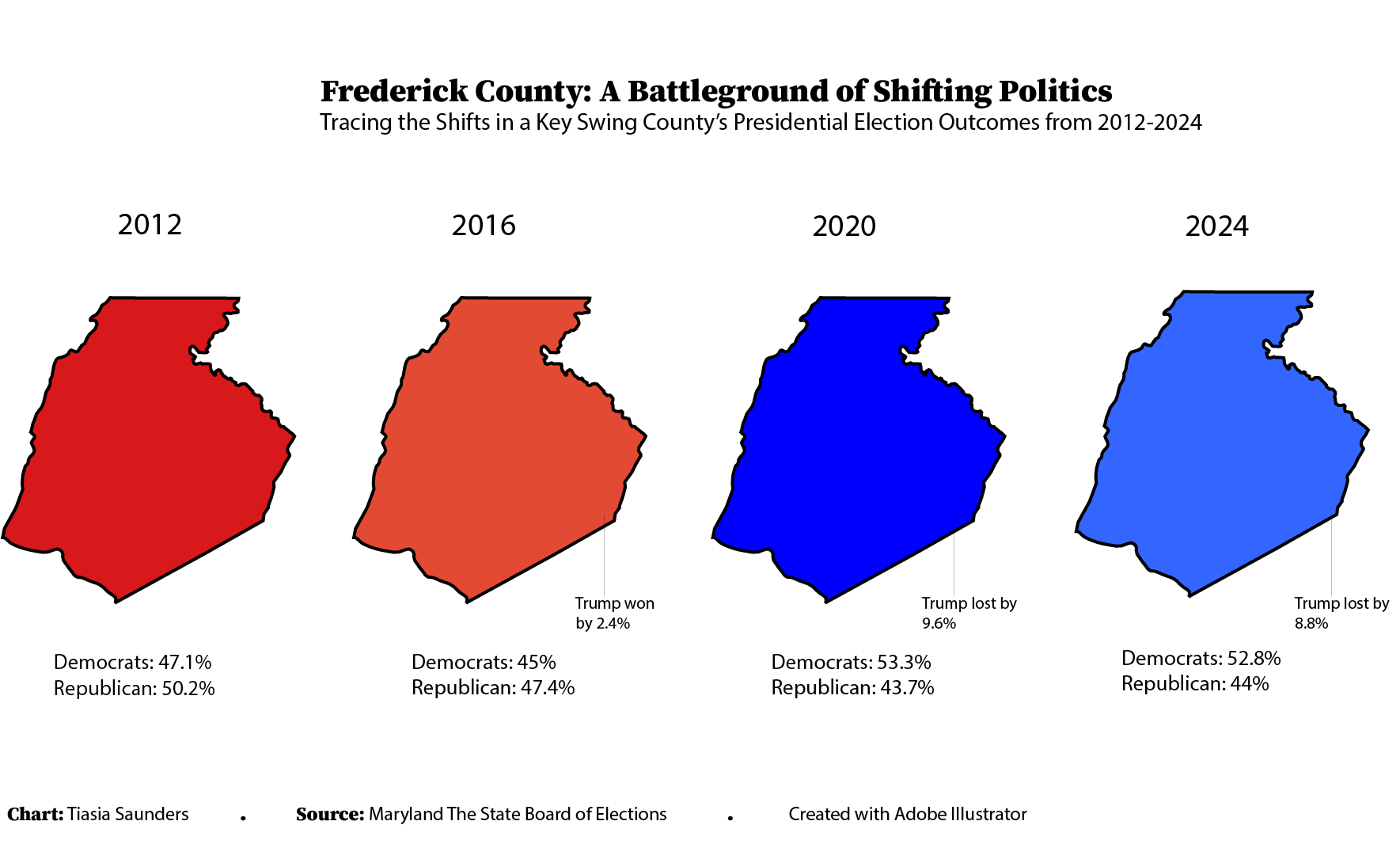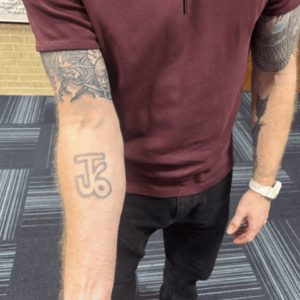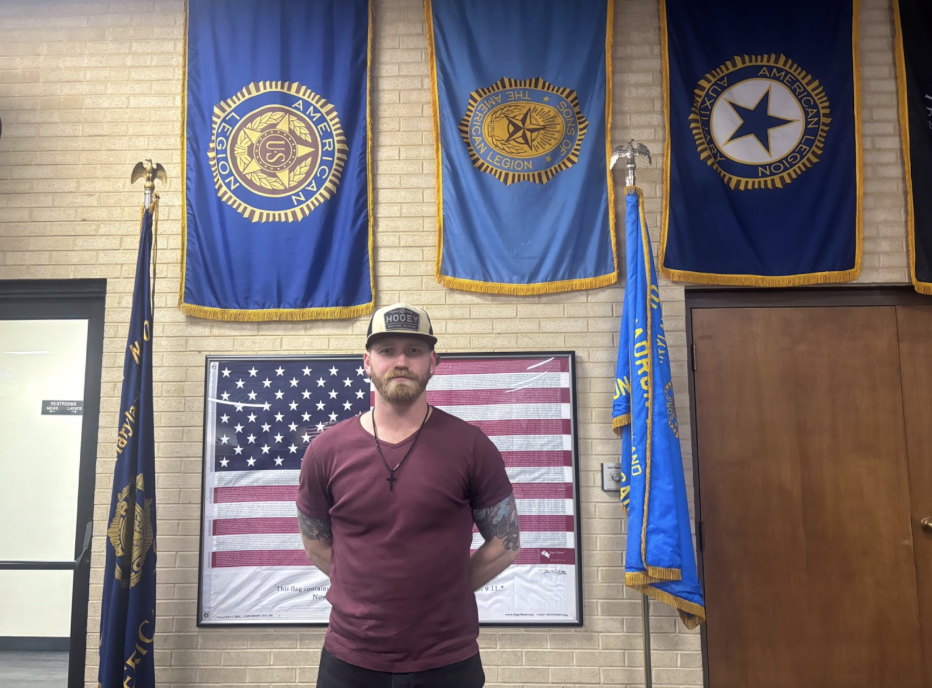Over a beer at the American Legion Post #10 in Boonsboro, Maryland, Steven Cook recounted how he got kicked out of his Salisbury University fraternity and dropped out of school after his assault on police officers during the Jan. 6, 2021, insurrection at the Capitol came to light.
But since President Donald Trump pardoned all the attackers and Cook left prison five months into a 28-month sentence, he said he has felt welcomed and supported by new acquaintances in his community. One veteran even picked up his $150 dinner tab after hearing his story, he told Capital News Service in a recent interview.
In March, the Republican Women of Baltimore County hosted Cook and five other convicted Marylanders at a banquet where they were celebrated as heroes. Cook did not hold back.
“I whacked these officers. I can’t lie about it,” Cook, 26, told the audience, according to a video recording of the event. “I was one of the ones who started the, what they call, insurrection.”
Cook, who is from Frederick County, said he fled to Virginia when he learned of a warrant for his arrest and was apprehended only after getting into a bar fight that drew a police response.
The banquet audience wasn’t disturbed by Cook’s revelation of violence or his actions afterward. Instead, they warmly welcomed him and the others as new celebrities.
“He heard the call of God on that day … and answered,” Louise Baker, the RWBC president, told members, according to the video.
“I call them my J-Sixers,” Baker told CNS in an interview. “They were ready, willing, able, excited, enthusiastic and grateful,” to share their stories with the club, she said.
Of the 1,576 people charged with criminal acts committed that day, CNS found that 46 came from Maryland, a historically Democratic state with a moderate Republican minority.
At least 15 Marylanders were convicted of or pleaded guilty to assaulting police officers, including Cook. Christopher Alberts, of Pylesville, carried a loaded 9mm pistol on Capitol grounds, assaulted officers and was sentenced to seven years in prison. Scott Miller, of Millersville, struck an officer with a long wooden pole multiple times and threw a speaker at police. He was sentenced to 5½ years in prison.
The full pardons and swift public acceptance of people who fought police and tried to obstruct the transfer of power to President-elect Joe Biden are deeply concerning to domestic extremism experts, who say widespread political violence in the United States is no longer unthinkable.
The pardons “contribute to the normalization” of violence, said Robert Pape, the founding director of the Chicago Project on Security & Threats at the University of Chicago, which recently released an exhaustive analysis of Jan. 6 participants. People “may not really be consciously thinking, ‘Oh, I’m supporting Jan. 6 violence against police.’ But … they essentially are.”
Robinson Woodward-Burns, a Howard University professor of political science, said public acceptance of such a violent attack stems from the polarized state of American politics.
“The polarization makes the normalization of insurrection possible, rather than going the other way,” Woodward-Burns said.
The vast majority of Marylanders criminally charged – 32 of 46 – come from strong Democratic urban and suburban counties, according to election data analyzed by CNS (see map), not from largely rural countries where Trump support is the strongest.
This finding mirrors the national trend discovered by Pape and his associates: that Jan. 6, involved mostly well-employed men with “suburban rage.” Unlike traditional far-right extremists who often come from the fringes of society, the majority of J6ers are from the mainstream, including elected officials, doctors, lawyers and small business owners. “They are responding to what they have to lose,” said Pape.
“These are the folks who are on the frontlines of demographic change” in places where people of color are becoming the majority. “They don’t see they have the political option of keeping the politics protecting them.”
Are Maryland Republicans shifting further right?
Democrats in Maryland have long outnumbered Republicans 2-to-1. But they elected a moderate Republican, Larry Hogan, as governor, twice. There has been some movement toward Trump Republicanism inside the Republican party, some election results show. But Maryland political experts are divided over its significance.
In the 2022 Republican gubernatorial primary, Trump supporter Dan Cox, defeated his Hogan-endorsed opponent, Kelly Schulz, by more than 8 percentage points. Cox lost to Democrat Wes Moore by 32 percentage points.
“You can certainly see some indication there of the party shifting away from the more moderate mainstream Republicanism, as represented by Larry Hogan, and clearly more toward the MAGA movement, which was absolutely represented by Dan Cox,” said Todd Eberly, a professor of political science and public policy at St. Mary’s College of Maryland.
But Patrick Gonzales, a longtime Maryland politics pollster, said Trump has won the same one-third of the Maryland vote in each of the last three presidential elections.
“When I see something like that, I don’t see any sort of shift of significance,” said Gonzales, who runs Gonzales Research & Media Services. “It’s been consistent.”
Frederick County’s liberal shift

Frederick County, linked to the Washington suburbs by an interstate highway, is the fastest growing county in the state. The county seat, the growing city of Frederick, favors Democrats, while the surrounding, sparsely populated rural areas lean Republican.
In April, dozens of people strolled through the Frederick Gun and Knife Show at the Frederick Fairgrounds, a county institution.
Rows of tables displayed weapons – from 200-year-old shotguns to modern automatic rifles – military memorabilia and T-shirts with slogans like “Ammosexual” and “Trump: Better Coverage Than 5G — Can You Hear Us Now?” A Confederate flag stood upright and conspicuous.
Democrat Katie Nash, president of the Frederick City Council, said it can be jarring to leave the city and enter the more conservative areas. “We kind of take it for granted that we live in this blue bubble,” she said of the City of Frederick, population 85,000. “And then when we go out to the county, where we’re in this sea of red, we’re like, ‘Where do we live?’”
Nash said she has seen a rise in slurs against immigrants and the transgender community in the city that “I never would have thought I would hear people say out loud in public…hate speech uttered in public without any sort of embarrassment or concern for the public good … just awful stuff that is really hard to hear.”
Adam Obest, a 20-year Army National Guard veteran, 10-year federal employee with six children, was convicted of assaulting and resisting law enforcement.
Pardoned before he was to serve time in prison, Obest, from Frederick County, said he felt shunned by his community after his Jan. 6 participation became public. He lost his government job and youth basketball coach position. After Trump’s pardon, though, he said he has felt a shift.
“A lot of family, a lot of church members, a lot of people…even people that were afraid to talk to me, generally speaking, they were very happy,” he told CNS. Obest has also found a new job as an adviser for a solar energy program. His life is back on track, he said.
Simple population density may also account, in part, for why more Jan. 6 participants come from Democratic counties in Maryland.
Being surrounded by not just Democrats but liberal Democrats in places like Montgomery, Howard and Baltimore counties, Trump supporters may have been “exposed to unfriendly, hostile, political opinions,” said Matthew Crenson, professor emeritus of political science at Johns Hopkins University. “They may have been induced to become hostile themselves, which may have driven them to Washington on Jan. 6.”
Rifts among Trump voters and political observers
Gaithersburg Republican Steve Schultze, 36, a construction worker, said he stood outside the Capitol with a friend on Jan. 6. He said he considered the events that unfolded a normal protest for “a rigged election.”
Hyattsville resident Cory Knechtges, 32, a Starbucks shift supervisor who called himself an independent and voted for Trump in the last three elections, said he believes Jan. 6 was largely a nonviolent demonstration and was “glad” about the pardons.
House Freedom Caucus Chairman Rep. Andy Harris, R-Md., the only Republican House member from Maryland, declined to comment on the pardons but told CNS in a statement: “Four years after January 6, 2021, those Justice Department resources should no longer be used to investigate, prosecute or continue to incarcerate those who were on Capitol grounds that day.”
Former U.S. Rep. Michael Barnes, D-Md., who retired as co-chairman of the Board of the Office of Congressional Ethics in January, expressed the popular Democratic view of the president’s sweeping act of clemency.
“It was just an awful act by the president to pardon people who attack the police officers and attack our Capitol,” said Barnes, who told CNS he had wept watching the scene at the Capitol that day.
Democrats have overreacted to the Capitol attack, some Trump supporters say

Jackie Michels, a member of the Republican Club at Riderwood Village, a senior living community in Silver Spring told CNS: “The idea that [Jan. 6] was an insurrection was orchestrated by the left in the Democratic Party.”
Knechtges, the Starbucks employee, said he doesn’t think “the protests were as big of a deal as people still make them out to believe.”
Some Trump supporters, including Cook, believe that federal agents were present in the crowd that day, riling people up. During years of government and media investigations, no evidence was ever found to support the claim, according to the Justice Department.
Barnes disagrees with pardoning the violent Jan. 6 participants. “People will see that and think they can do anything in support of [Trump], and he’ll back them up,” he said.
Knechtges rejected that notion. “It’s pretty ridiculous, to be quite honest,” he said. “Generally speaking, the Trump voters all carry the same mantra of, ‘Try not to break any laws.’”
Cook, when asked whether he would be willing to fight for his beliefs in a similar way going forward, he uttered a resounding, “Yes. Yes, I am.”
Capital News Service reporter Emma Schmalz contributed to this story.


You must be logged in to post a comment.